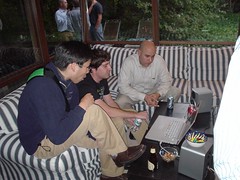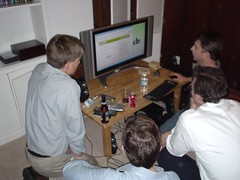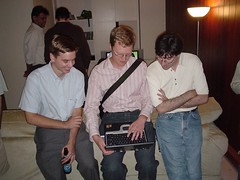Uncharacteristically, Jeff Jarvis posted some
complete nonsense on Buzz Machine yesterday. He wrote:
Robin Good puts together a few PowerPointable lines on the future of media:
Consumers become producers of content, and niche content surpasses by orders of magnitude the value of traditionally labelled commercial television and film. The value is not anymore in the best seller or in the blockbuster.
The value is in infinite choice of content and in the opportunity for the consumer to see content when she wants it: prime time is anytime, and anytime is prime time.
Meanwhile, allow me to quote from a
recent Slate review of the new Comcast NHL coverage, a piece entitled "The latest desperate attempt to top ESPN":
...if OLN's occasionally amateurish-looking production affirms for viewers that only ESPN can do sports right, then Comcast's national ambitions could find an early, icy grave...
...The network's buffoonish studio show doesn't do much to enhance OLN's credibility....
...The telecasts also gain instant credibility because of play-by-play announcer Mike "Doc" Emrick, who leaves the cliché-ridden competition in the dust—skaters don't merely pass the puck, they "feather it along,"...
...It's easy to sympathize with OLN's early struggles. The channel won the rights to broadcast NHL games...not two months before the opening face-off. At this point in its nascent coverage, OLN's basic charge is to transmit a crisp picture; at least the network's production values compare in quality to local cable broadcasts...
Unless you're so bought in to the new memes of free content from all (dude) you'll note a trend in the Slate review (and yes, they are part of the horrible MSM, in a new-media kind of way)
1) Talent2) Production values- "Doc" Emrick is talented and a plus
- The studio team are buffoons and a minus
- Production values are not yet up to ESPN's standard since the OLN only had two months to put the broadcast together, and viewers will notice.
Media is valuable, because our time and attention is valuable. We all choose to consume media from preferred providers, and the two mechanisms by which we choose those providers are the talent on display, and the production values around that talent. I loosely define production values as "capital investments which make the consumption of the core content more pleasant, informative, or easier". For writing, production values include good web design, non-intrusive ads, reasonable colors and fonts (
get busy, Andrew!) and so forth. For audible media, production values are things like the recording quality, background noise, the level of editing to remove slow or redundant sections, and so forth. For anything visual, the list of production values begins to be very long, and even more important.
It's a cliche that no one watches home video, despite its existence for decades. The two areas where I can think of home video having real general media value are a) occasional "man on the spot" news clips (Rodney King) and "America's Funniest Home Videos". What links these two together thematically is that they're essentially random -- something either funny or important happened in front of a turned-on video camera, and the value of the content outweighed its lack of production quality.
Here's a graphic that I put together in 2001 for a strategy I was doing for a mobile phone company. Any similarity to Web 2.0 standards is strictly coincidental - I've been thinking in power curves for a very long time. As you can see, based on the empirical data of a search I did on Amazon, there's a nice inverse relationship between cost of production and number of content items.

Why is this? There are two dynamics at play. First, in any gathering of people to create something, some people are more talented than others. I participate in some small-scale local theater and performance, and when there are six people in a room, usually everyone knows that one or two of them are better than the rest. These talented people tend to like working with other talented people, and over a small amount of time, quite a sorting effect occurs. Pretty soon the talented gang invents a name, throws out a shingle, starts charging, and voila! the naescent MSM is born.
When you add money into the equation, the effect is to enhance the differentiation. Perhaps a financier made money once, sometime, in a far distant past, by *not* seeking out the best directorial, writing, performing, and technical talent for his production - but I doubt it. When real dollars are at stake, people seek out the best, and then fund them. Those who aren't the best don't get funding. From movies to music to television to video games, this is an obvious trend even in relatively "new" media like video games.
Example of the "talent self-clusters" point
here,
here, and
here.
Example of the "financier seeking the best talent" point
here and
here.
Oh, ze world, she turns but she stays ze same...I do believe that temporarily, at least, some barriers have fallen in our new world. Here I am, writing this blog. But my choice with this blog is very clear: I can either a) invest a lot of time in it to create quality content on a regular enough basis to develop a readership or b) I can get on with my real life, which is running a
cool new startup called Zvents, and only post here occasionally because I feel like it, and not worry about becoming a media property. I am never going to out-do BuzzMachine in popularity or readership unless I put some serious work into the effort, which I'm simply not going to do. Therefore I will 98% remain on the "Consumer" side of the blog equation, despite my reasonable levels of inclination, ability, and empowerment to become a producer. Meanwhile, Jeff will sit on the opposite side of the equation, and take each successive step up the production values and monetization ladder which develops over the next few years, and in 36 months, it won't be possible to compare my blog to his with a straight face - if it even is now.
Jeff will have, by dint of wildly disproportonate readership, a "blockbuster" on his hands, giving lie to the baloney in his recent post.
Whenever anyone starts talking about new democracy in media, just remember that for the past 100 years, any normal person with about $50 to their name has been able to buy a typewriter and a sheaf of paper, sit down, and create a novel. For the past 100 years, being a successful novelist has been a well-paying, respected position. The fact that so few have managed to do this, despite the legions who have tried out of the near-totality of all who could have tried, indicates that there's something slightly more fundamental going on than big mean corporations holding back the little guy.
That something is the rarity of talent, the social network clustering effects of production values, and the reality that all of our time is limited, and brands are a great way to short-circuit searching costs.
The wonderment of the current age of the internet is not that the new winners will look any different than the old winners, but simply that a window of opportunity exists to make new winners at all.















 The most recent innovation (after the arrival of shaped charges) gaining popularity are infrared triggers for IEDs (improvised explosive devices). These triggers are a conversion of the simple "light" beams used in burglar alarms (see image) and as safety mechanisms on garage doors. The beams are activated remotely by radio controls when a patrol approaches. When the light beam is crossed the bomb goes off. Unfortunately, unlike radio controls the beams are not easily jammed. These new triggers have been used in numerous deadly attacks on British forces over the last several months.
The most recent innovation (after the arrival of shaped charges) gaining popularity are infrared triggers for IEDs (improvised explosive devices). These triggers are a conversion of the simple "light" beams used in burglar alarms (see image) and as safety mechanisms on garage doors. The beams are activated remotely by radio controls when a patrol approaches. When the light beam is crossed the bomb goes off. Unfortunately, unlike radio controls the beams are not easily jammed. These new triggers have been used in numerous deadly attacks on British forces over the last several months. 